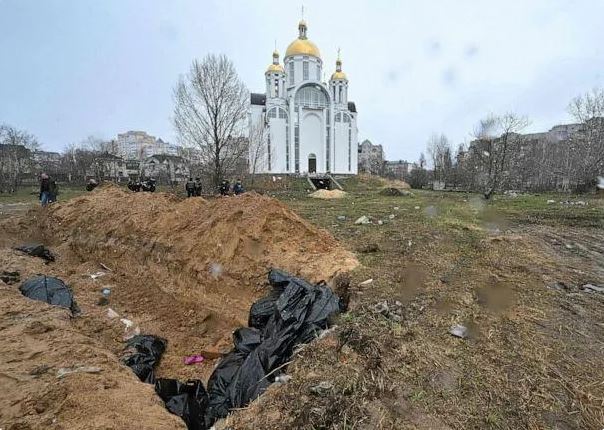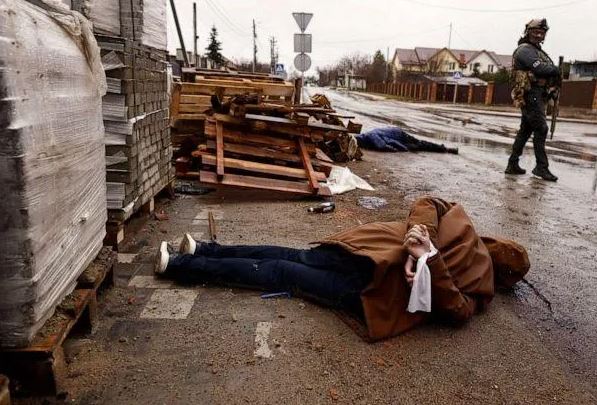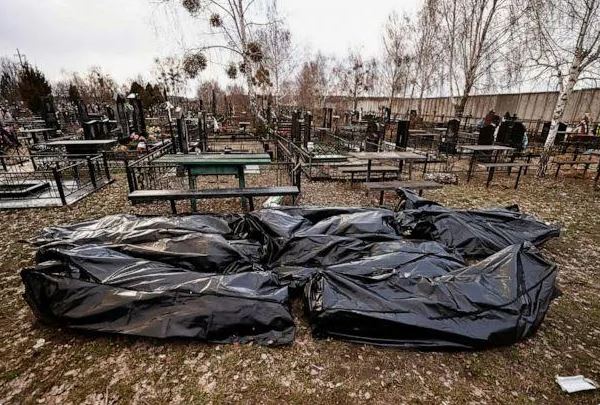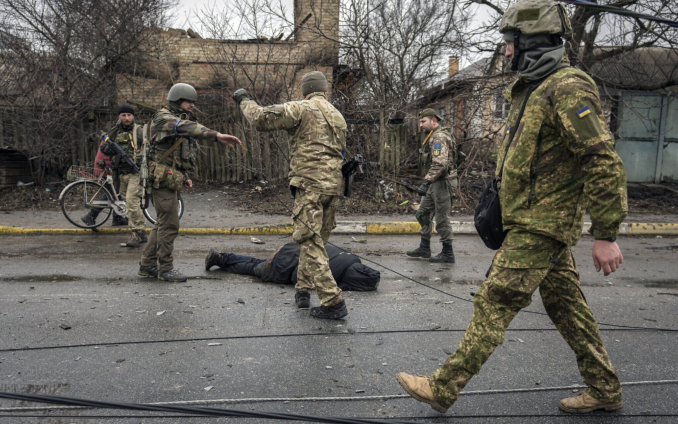As Mykola Pavlyuk stood outside his apartment building in Bucha, tears streamed from his eyes, cutting through the grime on his face. He was desperate to share his story but shook from the trauma of it.
Pavlyuk, 53, was one of the surviving residents of the besieged Ukrainian town, northwest of Kyiv, where gruesome evidence of killings and torture has come to light following the withdrawal of Russian forces.
He told ABC News that when Russian troops came to his apartment building, they killed all the men who were younger than 50, including two of Pavlyuk's friends.
Pavlyuk said he was given 20 minutes to bury them. He showed ABC News the shallow graves he hastily dug in the backyard, each marked with a plank of wood and topped with a religious icon. He wanted to give them whatever dignity he could.
"But it's too shallow," Pavlyuk said. "I just wanted to protect them from the dogs."
Pavlyuk and other residents spoke with ABC News in the days after Russian forces departed Bucha, leaving an apparent trail of death, destruction, terror and trauma that has shaken the international community. Hundreds of people were said to have been killed during the occupation.
When ABC News arrived on Tuesday, bodies still lay in the streets. World leaders have called for an investigation into whether war crimes, including genocide, were committed.
When Russian troops arrived in Bucha in late February, they asked everyone for documentation and forced the men to strip down naked to reveal any tattoos, according to Pavlyuk. They immediately shot and killed anyone whom they deemed a threat, without asking any questions, he said.
The mayor of the nearby village of Motyzhyn, Olga Sukhenko, and her family appear to have met the same fate. ABC News witnessed their lifeless bodies in a wooded area.
Another Bucha resident, who declined to give her name, told ABC News her husband was also forced to remove his clothes to show whether he had any tattoos.
Russian soldiers took over Pavlyuk's apartment building, turning the homes of Ukrainian families into wartime dormitories for drunk, violent thugs, he said. Rooms that Pavlyuk showed ABC News were strewn with blankets and old food.
Pavlyuk said he and his wife lived in the basement for more than month with little food or water, only leaving to cook on a stove outside.
He told ABC News they faced the constant fear of an arbitrary killing or a random act of violence, like when a friend was killed by a grenade he said was thrown as a joke by a drunk soldier.
The friend's body parts lay outside on the ground for days until Pavlyuk was allowed to gather them, put them in a bag and bury them in a grave next to his two other friends, he said.

More bodies were dumped in a mass grave outside a church. Residents had gone out to collect some of the dead from the streets while the town was under Russian occupation.
The trench was filled with bodies in black plastic bags that lay on top of other victims, who were either wrapped in sheets or nothing at all. Locals told ABC News there could be as many as 90 people buried there.
Russian forces invaded neighboring Ukraine on Feb. 24, seizing territory and bombing entire cities. As the war grinds on, Russia faces strong resistance from Ukraine, whose troops managed to take back some territory in recent days as Russian forces retreated.
According to Ukrainian Prosecutor General Iryna Venedyktova, at least 410 civilians have been found dead in Bucha and other recently recaptured towns near Ukraine's capital, where there's an ongoing investigation into possible war crimes committed by Russian forces.
Graphic images have emerged from Bucha showing unarmed individuals in civilian clothes who appear to have been executed with their hands or legs bound, sparking outrage from the United States and a number of nations and institutions.
Russia has denied responsibility, calling the images "fake" and saying all of its units withdrew completely from Bucha around March 30. An ABC News analysis of videos and satellite imagery confirms some of the bodies seen lying in the streets of Bucha were there as early as March 19, when the town was still occupied by Russian forces, contradicting Russia's claims that the scene was "staged" after its troops left.

While in Bucha, ABC News encountered a Human Rights Watch team gathering evidence of war crimes.
"What we've seen so far and what we've heard from residents - what we've been documenting - is really horrific, including reports that Russian forces have pulled people out of their homes, briefly interrogated them and then executed them," said Richard Weir, a researcher in the Crisis and Conflict division at Human Rights Watch.
A team from the International Committee of the Red Cross was also on scene in Bucha, assessing needs and delivering humanitarian aid.
"Humanitarian situation is dire," ICRC spokesperson Alyona Synenko told ABC News. "We have seen extremely vulnerable people - elderly, people with limited mobility, people who are sick, who are alone in their unheated apartments with no electricity, with no running water, with medical needs."

Bucha residents Tatyana Chernysh and her husband told ABC News they must have survived "by God's will" when so many of their neighbors did not.
"At any time, the occupiers could enter our premises and do with us whatever they wanted," said Chernysh's husband, who said he was too frightened to give his first name. "It was terrifying. It was awful."
The couple didn't leave their house while Russian troops occupied the town. They said "good people" brought them food and medicine. Although the Russian soldiers camped away from their home, Chernysh and her husband said they heard unyielding gunfire and that stray bullet pockmarked their house.
Since the withdrawal of Russian forces and the recent arrival of aid, Chernysh and her husband have finally come out of hiding to see what remains of their battered town. They recalled seeing bodies strewn across the streets and sidewalks.
"It is obvious their intention was to destroy Ukraine, destroy our people, destroy our economy, destroy our culture," Chernysh's husband said of the Russian troops. "They claimed they came to liberate. They didn't. They are terrorists."

After surviving such "senseless" horror, the family said they "feel safe" and intend to stay in Bucha, despite a lack of electricity, running water and reliable communication.
"It's where we live. We don't want to yield our homes to occupiers," Chernysh's husband said. "It is our town. It is our home. We are going to stay."
Although he admitted they might think twice if Russian forces return.
"Hopefully they won’t come back," he added, "but with them you can never tell."
Latest Stories
-
Tottenham beat Man Utd to win Europa League & end 17-year wait for trophy
16 minutes -
Clear and strong climate policies are antidote to economic uncertainty – UN Climate Chief
41 minutes -
Journalism has become politicised and cheap – KSM laments
47 minutes -
Climate Education reaches differently-abled children at Garden City Special School
49 minutes -
Mahama’s remarks on Cedi vindicate NPP’s economic legacy – Minority
58 minutes -
I lied about having radio experience to get hired – KSM
1 hour -
NLC direct University Senior Staff Association to call off strike
1 hour -
Shelters in crisis: Calls grow for gov’t support as caregivers struggle to protect vulnerable children
1 hour -
Black Sherif set for electrifying performance on COLORSxSTUDIOS on May 22
1 hour -
Ghana Card blocks prison graduates from National Service – Inmates appeal to Parliament to intervene
1 hour -
Richard Ndignan: United States of Africa – A call for continental rebirth and unity
2 hours -
Hoefman Laboratories boosts maternal care at Ridge Hospital with equipment donation
2 hours -
One in three babies born to HIV-positive mothers at risk of toxoplasmosis, KNUST study reveals
2 hours -
Erroneous to think my role as Torkornoo’s lawyer in injunction application against probe affect optics – Godfred Dame
3 hours -
Suspened CJ Torkornoo is merely barking – Ansa-Asare on injunction to stop removal probe
3 hours

